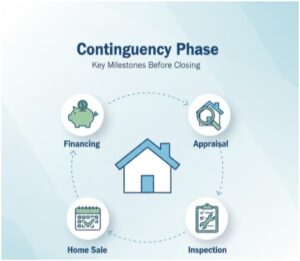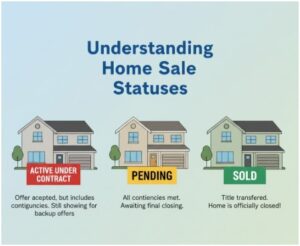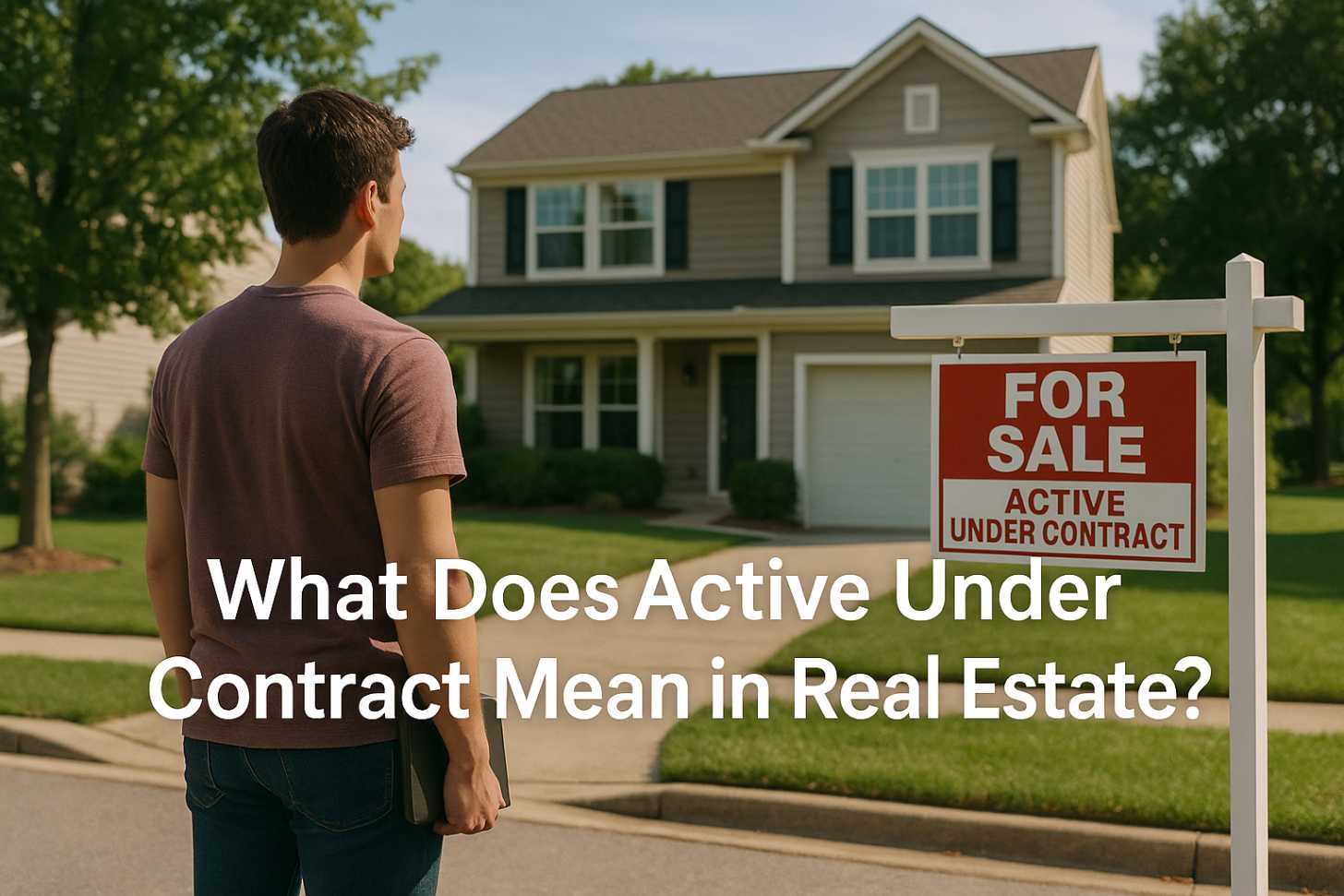I’ll be honest: the first time I saw a house I loved marked “active under contract,” I thought I was too late. My heart sank faster than a dropped smartphone screen-first on concrete.
But a few weeks later, that same house popped back on the market — and this time, my offer was accepted.
That experience taught me a lesson that most buyers don’t learn until it’s almost too late: “active under contract” doesn’t mean the door is closed. It means the story isn’t over yet.
If you’ve ever fallen for a property only to see that confusing phrase attached to it, you’re not alone.
Real estate jargon can feel like a secret language, but once you understand what it means — and how to play it smart — you’ll see opportunities most people overlook.
What Does Active Under Contract Mean in Real Estate?

When a property is labeled “active under contract,” it means the seller has accepted an offer from a buyer — but the sale isn’t final.
The deal is still in what’s called the contingency phase, a conditional period where several important boxes need to be checked before the sale can close.
Think of it as the “engaged” stage of a relationship. The house and buyer are committed, but they’re not married yet — and the wedding could still be called off.
During this time, the property remains listed as active on the market. Sellers can keep showing it and even accept backup offers in case the first deal falls apart.
This phase typically lasts 30 to 60 days, and it’s where most real estate deals either move forward or unravel.
Financing issues, inspection surprises, or low appraisals can all derail a sale — and that’s where opportunities for buyers like you come in.
Why Does a Property Stay Active Under Contract?

I used to think “active under contract” was just a fancy way of saying “sold.” But now I know it’s about conditions — also known as contingencies — that protect both the buyer and seller.
These contingencies have to be resolved within a specific timeframe before the deal can move forward.
Here’s a quick breakdown of the most common ones:
| Contingency | What It Means | How It Affects the Deal |
| Financing | The buyer needs final mortgage approval. | If the loan is denied, the deal can collapse. |
| Appraisal | The home must appraise at or above the sale price. | A low appraisal could trigger price renegotiation or cancellation. |
| Inspection | A professional inspects the home for issues. | Major problems can lead the buyer to walk away if the seller won’t fix them. |
| Home Sale | The buyer’s purchase depends on selling their current home. | If their home doesn’t sell, they might back out. |
If any of these conditions aren’t met, the contract can fall through — and the property goes back on the market. That’s why sellers keep the listing active. It’s their safety net.
What Does Active Under Contract Mean for Buyers Like Me (and You)?

Here’s the good news: you’re not out of the game. When I first learned this, it completely changed how I approached home hunting.
If you’re a buyer and a house you love is marked “active under contract,” you still have options — and understanding them can give you an edge.
First, you can still submit an offer. While the seller can’t accept it right away (because they’re already under contract), they can accept it as a backup.
If the first deal fails, your offer might become the new primary one — without the property ever going back to public bidding.
Second, you can usually still tour the property. Many sellers continue showings during the contingency phase, especially if they’re open to backup offers. That’s your chance to fall in love with the place and be ready if the current deal collapses.
Here’s the reality check, though: your chances are lower because someone else has a head start. But they’re not zero. Deals fall apart more often than you’d think, and being second in line beats being nowhere in line at all.
What Does Active Under Contract Mean for Sellers?
From a seller’s perspective, keeping a property “active under contract” is a smart move — and one I’ll never underestimate again.
It offers a safety net. If the current buyer can’t secure financing, backs out after a bad inspection, or fails to sell their own home, the deal is off.
By continuing to accept backup offers, the seller reduces the risk of starting from scratch if that happens.
It also gives them leverage. The knowledge that there are other interested buyers waiting in the wings can motivate the current buyer to meet contingencies quickly and avoid unnecessary delays.
In short, “active under contract” helps sellers stay in control during an unpredictable part of the selling process. It’s like keeping a Plan B ready while Plan A tries to work itself out.
How Is “Active Under Contract” Different From Other Real Estate Terms?
I used to lump “active under contract,” “pending,” and “contingent” together — but they’re not the same. Knowing the difference can help you read listings like a pro.
| Status | What It Means | Backup Offers Accepted? |
| Active Under Contract | Offer accepted, contingencies active, backup offers welcome. | Yes |
| Pending | All contingencies cleared, deal near finalization. | No |
| Contingent | Often used interchangeably with active under contract. | Usually |
| Under Contract | General term for an accepted offer. | Sometimes |
“Pending” is the stage where things are nearly wrapped up — the sale is about to close, and backup offers usually aren’t accepted. “Active under contract,” on the other hand, means the deal is far from done.
How Can You Take Advantage of an Active Under Contract Listing?
Here’s the strategy I wish I’d known sooner: treat “active under contract” as an invitation, not a rejection.
Start by talking to your agent. They can reach out to the seller’s agent and find out how far along the current deal is and whether backup offers are being considered.
Sometimes, deals are on shaky ground, and your strong, prepared offer can look more attractive if the first buyer stumbles.
Next, get your financing pre-approved and have your paperwork ready. If the first contract falls apart, being ready to move fast can make all the difference in winning the property.
Finally, keep watching the listing. If it changes from “active under contract” to “pending,” your chances shrink dramatically. But if it suddenly goes back to “active,” it’s game on — and you’ll want to act quickly.
FAQs About What Does Active Under Contract Mean
Q1: Can I still make an offer on a house that’s active under contract?
Yes, you can. While the seller can’t accept it immediately, they can accept it as a backup. If the first deal falls through, your offer might automatically move into first position — sometimes without new negotiations.
Q2: How often do active under contract deals fall through?
It happens more often than you might think. Industry estimates suggest that about 5–10% of deals fail during the contingency phase. Financing and inspection issues are the most common reasons.
Q3: Should I schedule a showing for a home that’s active under contract?
If you’re serious about the property, yes. Many sellers still allow showings, especially if they’re open to backup offers. Seeing the property in person also helps you decide how aggressive you want to be with your backup offer.
Q4: What’s the difference between contingent and active under contract?
In many markets, they mean the same thing: the seller accepted an offer, but contingencies still need to be met. However, “active under contract” more clearly indicates that the seller is still open to backup offers.
The Final Word: Stay Ready, Stay Hopeful
Here’s the truth I learned the hard way: “active under contract” doesn’t mean the dream is dead — it just means the story isn’t finished.
Whether you’re a hopeful buyer or a strategic seller, understanding what this status means helps you make smarter moves.
For buyers, it’s a reminder to stay prepared and keep an eye on opportunities others might ignore. For sellers, it’s a safety net that keeps options open until the deal is truly done.
And here’s my personal tip: real estate is a marathon, not a sprint. The house that slips away today might circle back tomorrow. I’ve lived it — and sometimes, being patient and persistent pays off in ways you never expected.










